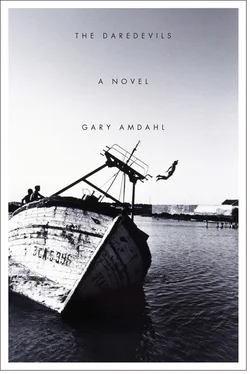“What mess?” asked Charles.
“The one you’re in?”
“Okay, go ahead, I’m sorry I interrupted you.”
“A fast and experienced gunman will be a valuable asset to your organization. I am, I know all too well, unprepossessing and often in need of a bath, but I have been told too many times for me to ignore it that I am unusually intelligent. You may have heard how it is, sir: if enough people tell you that you are drunk, you ought to consider lying down. I have no wish to read books or learn a profession, but I am gifted with brains. I have skill in persuading unwilling witnesses to testify in court, and for finding witnesses willing to testify in court. For mixing, generally speaking, with the lower classes, I am first-rate.”
“I like to close interviews on a note of class superiority.”
They shook hands warmly. Rejean Houle had a big black moustache and was wearing a suit and tie and a bowler hat.
“Ray-zhan Oool-uh,” said Charles. “I think we’ll call you Ray John Howell, if that’s all right with you.”
“Certainly it is, sir,” said Rejean. “Call me what you will.”
“By the way, Ray.”
“Yes sir.”
“Does the name Charles Minot mean anything to you?”
“No sir.”
“Ever been in San Francisco?”
“No sir. Never west of zuh Mississippi.”
“And are you, let’s see, a narcotics addict yourself?”
“No sir. Never west of the Mississippi.”
“Never west,” the man muttered as he scribbled on a pad, “of zuh—” and now spelled it out in a kind children’s sing-song, “ Mis. sis. si. pp. i. That used to be so hard to spell it used to be make me cry, but since I studied spelling. it’s. just. like. puuuumpkin piiieee.” He dotted the several i’s with dramatic taps of the pen on the pad, looked up, and said it was terrific. He told Ray he didn’t have a political bone in his entire goddamned body and hoped Ray felt the same.
“Welcome aboard, Ray, welcome aboard.”
Or rather, he thought, welcome overboard, into oozy eel slime of indistinguishable and effectively invisible plot and counterplot. Ray’s job would be the simplest of all, save Charles’s own, unless somebody decided to pay him more money — though such a sum was hard to imagine coming into easy being: make sure that no one killed Vera. Was there a real chance of this? On the surface, of course there was not; but just below the surface, of course there was. Charles believed he now had only a single role, an omni-part, if such a thing could be said to logically exist: to keep Vera safe and happy. That he would dash into burning buildings went without saying. He would plunge into icy rivers, as well. He would throw himself upon a suitcase bomb. He would die for her, and he would kill for her. His thinking was very clear up to that point: everything in the world could be easily and swiftly replaced — except Vera. Beyond that point it was not clear, but beyond that point he no longer had any interest.
On the first truly warm day that spring, a day objectively not all that warm but which seemed so compared to the months they had spent below zero, the great white mountains appeared to subside in geological time, an orogeny, leaving only gentle brown hills of matted grass and streams flowing everywhere with melted snow. The skeletons of what had seemed permanently dead trees — skeleton was the wrong word: more pencil tracings of exploded and frozen nervous systems, of brains — had green buds popping out of softening, moistening gray wood. The gray of the windblown clouds was bright and rich, partaking as much of their sunlit white regions and the sweet blue of the dome as of the darkness of the gentle, warm rains they held and promised.
It was on this day as well, a Tuesday, the last in April, that Andrew Minot arrived in Saint Paul with Gus and Tony. They were on their way to New York, a first visit for the younger brothers. The next day, Amelia and Pastor Tom arrived, on their way to Washington, DC. There was a good chance they would move there.
Amelia was wearing some kind of Swiss village costume: a long red skirt tied with cloth belt embroidered with red, yellow, and blue flowers and ended with tassels, a long black velvet apron, a kind of heavy cloth breastplate with a medallion of the Appaloosa Society in the center, a dark blue ruffle around her neck, and her long hair piled up under a fez-like toque embroidered with very small flowers of every color you could quickly think of.
Given the trim gray suits, starched white collars, and quiet ties that her brothers and husband were wearing, she stood out in a way that was not simply colorful and different, but faintly alarming.
They were all staying at the Saint Paul Hotel, top floor, with a lovely view of the stark and muddy Rice Park, a view that appeared to change before their eyes, as if a pointillist were touching the scene with his smallest brush dabbed in a tender green. To the left was the great white library, to the right a pink granite castle with turrets and gables and towers and a red-tile roof, the Richardsonian Romanesque home of a fairy monster that housed the post office and courthouse; directly across the park was the Hamm Theater, a colossal structure that could hold five thousand opera-going prairie oligarchs.
Lunching in the hotel’s restaurant, waiting for Charles, who was conducting some business, to join them, Amelia remarked that it was a very pleasant little city, an ideal place for a person, like Charles, who needed a real spring and fine weather and calm business to restore a sense of rightness in the world.
“I would like to know what’s wrong with the world,” said Gus.
“I,” retorted Tony, “would like to know what ‘rightness’ is.”
Because the table was occupied solely by immediate members of their family — Pastor Tom was an uncle by marriage but seemed very much more like one of the older brothers — but in a public place, Gus and Tony were exploring manners. When Charles arrived, they were planning to shake his hand and say, “Good of you to come, old man,” and, “Good to see you,” and go around the table shaking everybody’s hand, having received this myth of a behavior Charles had long abandoned, and perhaps never truly possessed.
“The Canaanite festivals,” began Pastor Tom, “regeneration, redemption, Jesus Christ.”
Charles could now be seen entering the restaurant with the woman from his cast.
“I don’t remember her name,” said Amelia.
“Vera?” said Pastor Tom.
“Ye-e-s,” said Tony, musingly.
“Vera,” said Gus celebratorily, almost as if he were making a toast.
“I rather enjoyed being backstage,” Tony continued, still musing.
“Buddy boys,” said Andrew quietly. “I don’t think we’ll be wanting to talk about that, all right?”
“Right you are, Brother Andrew!” sang Gus.
“Thanks awfully for the tip, setting us straight, old chap,” drawled Tony.
“Your friends died,” said Amelia, “and you are laughing.”
The boys were not at all abashed, and in fact wished now to perform a bit for Vera.
They appeared to prepare, to in a way rehearse, as Charles and Vera drew up to the table.
“Friends come,” Gus began.
“And friends go,” finished Tony.
They stood and moved around the table, shook Charles’s hand, embraced Vera, and returned to their places.
“I’m sorry we’re late,” said Charles.
“He is late,” said Gus, “and he is sorry.”
“We are just so glad you’re here,” said Tony.
“I think we all know each other,” said Charles, ignoring his younger brothers, “but in case you’ve forgotten, this is my wife, Vera.”
“That’s splendid!” shouted Tony.
“We hadn’t forgotten, old chap,” said Gus.
Читать дальше












